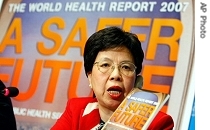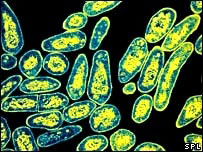2007年VOA标准英语-WHO: Infectious Diseases Spreading Rapidly Arou
搜索关注在线英语听力室公众号:tingroom,领取免费英语资料大礼包。
(单词翻译)
By Lisa SchleinGeneva
23 August 2007
The World Health Organization warns new and emerging infectious diseases are spreading rapidly around the world threatening the health, economies and security of all nations. This year's World Health Report says global public health security depends on international cooperation more than at any previous time in history. Lisa Schlein reports for VOA from the launch of the report in Geneva.
The World Health Organization says diseases are increasingly threatening the health of people around the world. This is due to the frequency and speed with which people and cargo1 are moving around the planet.
The report notes airlines carry more than two billion people a year. Those people who are sick take their diseases with them and pass them on from one country to another in a matter of hours.
 |
| Margaret Chan answers journalists' questions at press conference for launch of World Health Report 2007 |
"Changes in the way humanity inhabits the planet have created multiple opportunities for new diseases to emerge, and for older diseases to resurge or become established on new continents," Chan said. "Population growth, rapid urbanization, intensive farming practices, environmental degradation2, and the misuse3 of antibiotics4 have placed enormous pressure on the microbial world."
The report finds new diseases are now emerging at an unprecedented5 average rate of one per year. Since 1967, it says at least 39 new diseases have developed. These include HIV/AIDS, Ebola hemorrhagic fever, Marburg fever and SARS.
But, for Dr. Chan, the biggest threat to people around the world is posed by a future pandemic of avian influenza6, which, she says, could potentially kill millions of people.
"The sheer size of the problem, no single country or agency can handle the next pandemic single-handedly," Chan said. "And, that calls for international collaboration7, global solidarity8 and collective defense9 system…But, if we implemented10 the international health regulation…the world stands a better chance to defend itself against a future risk coming from outbreaks. And, I am confident that with better preparedness, we will mitigate11 the negative health impacts from outbreaks."
Under the International Health Regulations, countries are supposed to report potentially dangerous health emergencies to the World Health Organization and to share information that could help control the disease.
The WHO report urges people to remain vigilant12 in managing the risks and consequences of the international spread of polio and the newly emerging strain of extensively drug-resistant TB. It also warns about new health threats linked to potential terrorist attacks, chemical incidents and radio nuclear accidents.

Electron microscope image of XDR-TB bacteria
 收听单词发音
收听单词发音 




